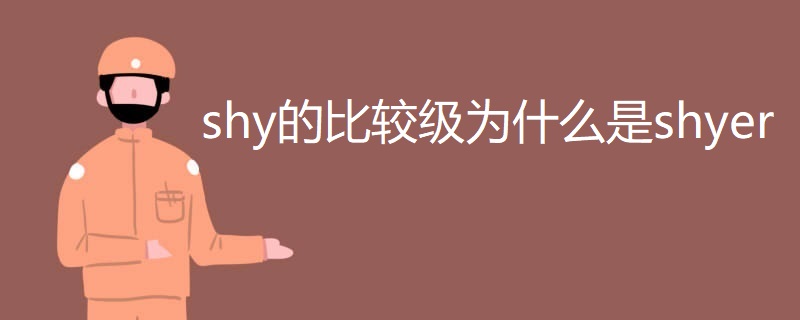-
-
shyer比较级是shyer,是因为shy前没有一个是元音,像happy前面有一个元音字母而y前是辅音所以变为happier,其他单词也是一样。shy的意思为“羞怯的、腼腆的、胆小的”。

shy的用法
分类:语法详解 作者:本站原创
shy的用法和例句,现梳理总结如下:
shy adj. 羞怯的、腼腆的、害羞的
My aunt was a quiet shy woman.
我的阿姨是一个安静害羞的人。
The little boy has a shy smile on his face.
小男孩脸上有着腼腆的笑容。
Some teenagers are painfully shy.
有些青少年非常腼腆。
She was too shy to speak to strangers.
她太腼腆了,以致不能和陌生人讲话。
shy还可指不愿意或害怕做某事
She isn’t shy about saying no.
她不怕说不。(敢于说不)
比较级怎么变化
1.单音节以及少数双音节形容词或副词大致按以下规律变化:
(1)一般在形容词或副词后面直接加–er变为比较级,加–est变为最高级。如:
old—older—oldest
high—higher—highest
(2)以重读闭音节结尾,且末尾只有一个辅音字母的,则双写最后一个辅音字母,再加-er变为比较级,加–est变为最高级。如:
big—bigger—biggest
thin—thinner—thinnest
(3)以“辅音字母+y”结尾的,则将改y为i再加-er变为比较级,加–est变为最高级。如:
busy—busier—busiest
heavy—heavier—heaviest
(4)以字母e结尾的,直接加–r变为比较级,加–st变为最高级。如:
large—larger—largest
free—freer—freest
2.多音节以及某些双音节形容词或副词变为比较级或最高级时,则通常在其前加more变为比较级,加most变为最高级。如:
important—more important—most important
difficult—more difficult—most difficult
3.少数单音节,特别是分词形容词,须在前面加more变为比较级,(the)most变为最高级。如:
fond—more fond—mos tfond
pleased—more pleased—most pleased
4.有些的比较级或最高级有两种形式,如:
clever—cleverer/more clever—cleverest/most clever